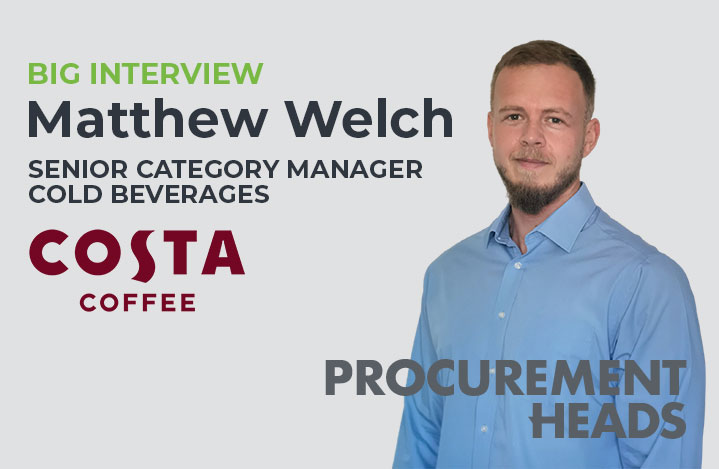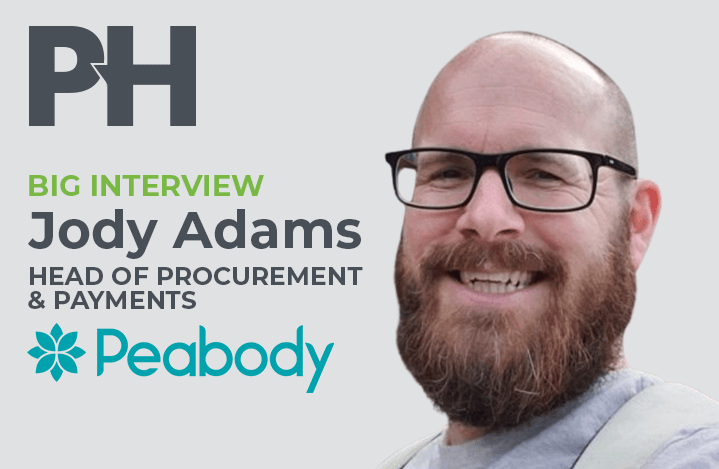An experienced indirect and direct buyer for both domestic and international markets, Matthew spoke to Rahim Ali Ahmad for Procurement Heads‘ latest Big Interview.
How did you get into procurement?
My career to date has been varied, I initially spent nearly eight years involved in road traffic law, insurance and logistics.
I reached a crossroads in my career in my late 20s where I had been exposed to pockets of procurement in the absence of a standalone procurement function and liked what I saw.
I was either going to continue in logistics and insurance or pivot and try my hand at procurement.
After much consideration, I took the plunge, changed direction, and secured my first full procurement role at Tesco buying a variety of GSNFR.
I instantly fell in love with the profession, which was helped by being surrounded by like-minded people who were engaged and believed in the value they could add to the organisation.
I’ve since spent the last seven years in various procurement and category management roles managing both direct and indirect spend sourcing both locally and internationally.
I’ve been lucky to source a variety of products/services ranging from haulage, shelving, R&M, cold water prawns, and even something called Golden Twinkle Sprinkle.
Currently, though I’ve mainly moved away from sourcing, I own Costa’s current dairy milk contract.
At the end of last year, I moved into a Senior Category Manager role owning all of the cold beverages at Costa including development and ranging.
Reflecting on my decision to change career I wouldn’t have changed it and would – and do – recommend the profession to others!
What are you most passionate about when it comes to procurement?
When I think about what has driven me throughout my time in procurement the impact on the customer or end-user has always been one of the most rewarding elements.
Within procurement, we can shape the narrative, proposition, and product to meet consumers’ needs not only focusing on the traditional elements of commercials.
Being able to procure value-add items and work strategically with our partners enables me – and the wider – function to meet the different need states of consumers, which is a feeling that can’t be beaten.
Whether that be at Tesco working on their Free Fruit for Kids initiative, being shortlisted in the CIPS Awards at Whitbread, or currently sourcing products which bring people together so a moment can be shared and enjoyed, seeing the output from your work being used or consumed is so rewarding.
What role have you and the procurement function played in enabling the bounce back post-pandemic?
The pandemic significantly impacted Costa, overnight we found ourselves closing more than 2,700 store locations.
Collectively we found ourselves pivoting, having been focused long term strategic initiatives to refocusing on tactical activities, closing the estate, mitigating waste and risk in the supply chain.
During this time, we worked hand in hand with our supply base.
It was essential we were able to adapt to changes in government advice and guidelines.
Critically, across both beverage and food, ensuring that we had product in the right place at the right time for when stores would re-open, was a key priority while limiting the potential product waste in store.
Continuity in supply proved challenging with infection rates impacting not only Costa team members but that of our suppliers.
At times I was chairing daily calls internally and separately with our suppliers to manage production, logistics and mitigating as many risks as possible across the business.
Being comfortable with change during this time proved to be a key trait of the team with frequent amendments to plans being made.
The ability to quickly adapt to what seemed like an ever-changing situation proved fruitful as we emerged from the pandemic being able to support our customers as we did before.
What challenges are you and your team experiencing in the current market?
Looking back it has been a challenging few years, we have faced the challenges Brexit brought us, adapted our entire approach throughout the pandemic and now we’re facing further macro impacts namely the war in Ukraine.
Personal resilience, and that of my team, is very much front of thought given the continually changing landscape in which we operate.
At present global instability and closer-to-home inflation throughout 2022 have changed the focus for both myself and the wider team, I am now having to navigate inflation in a number of categories which are directly impacted by feed, fuel, fertilisers and labour.
Looking at how we source, where we source, and how we manage stock has been very much a hot topic as of late as we continually look to adapt to the current environment.
I believe that these challenges will continue throughout next year and will soften thereafter however in the interim it is an ever-changing landscape.
More broadly speaking, consumer habits have changed and are continuing to change, coupled with the existing challenges making procurement a somewhat exciting profession to be involved in at present.
There are multiple layers of complexity now being factored into sourcing and ranging strategies to ensure that we are able to adapt to these needs & able to change direction, procurement never stands still.
How has the function changed as a result of this?
Overall, the function is continually changing and evolving to both macro and micro factors and we will continue to do so, given this, I don’t feel that our function has changed all that much, rather it has continued to adapt.
Our focus and priorities may change, and our consumer requirements may change, but working strategically with our supply base and stakeholders will always be constant throughout.
Some sourcing approaches being taken have however changed; one example would be as a result of extended freight times from China, I have been exploring nearshoring sourcing opportunities.
Another would be prior to the conflict in Ukraine I was looking at other BRICS countries to see what opportunities would be available, this has now been paused while I focus on short-term requirements.
How is procurement viewed within your organisation?
Having spoken to others in the profession I know that this is not just applicable to Costa, however, I would say that the profile of procurement has increased significantly since both Brexit and the pandemic.
Procurement within Costa has always been valued and has high engagement in all sourcing requirements.
Throughout the pandemic however it felt as if all eyes were on us to deliver and support the business. Our voice internally has certainly become louder and this has been reflected in some senior appointments aligned specifically to procurement.
Although it isn’t applicable at Costa I think about the old cliché that procurement is blockers, this couldn’t be further from the truth in that other functions actively seek out assistance, help, guidance and insight around their requirements.
Other functions saw what we delivered during the pandemic, not necessarily the how, but the appreciation is clearly seen through both increased early engagement from stakeholders and from the change in the language used internally.






